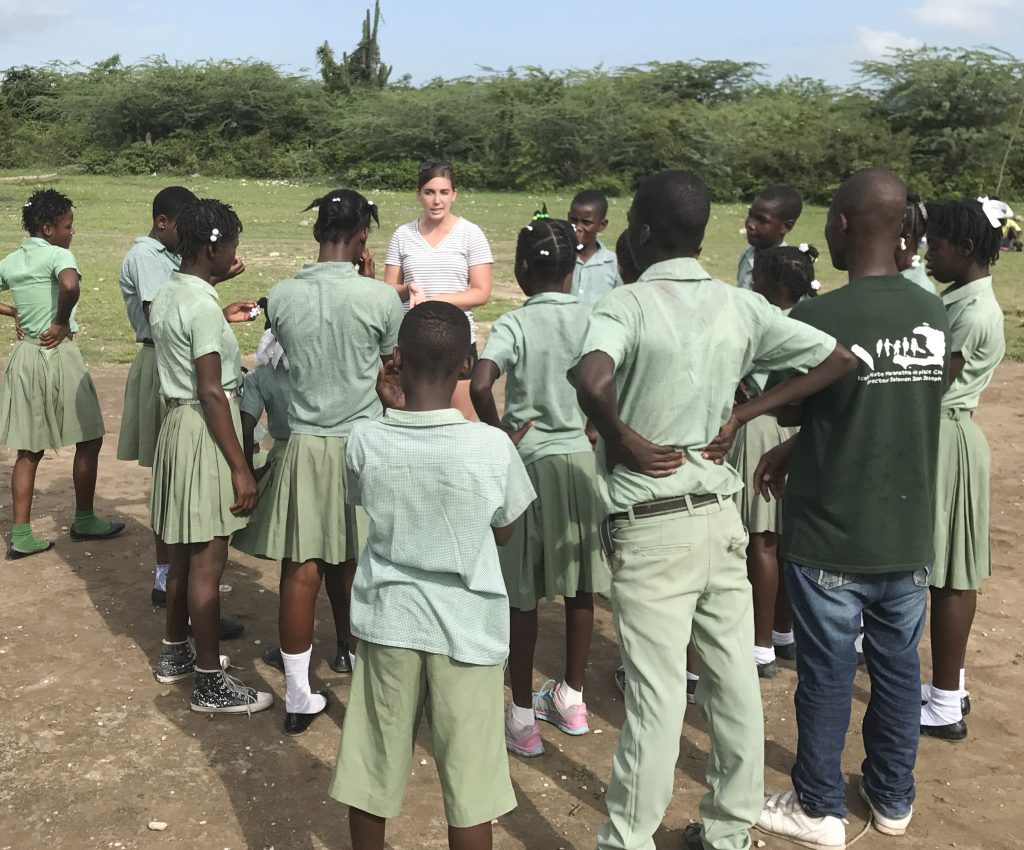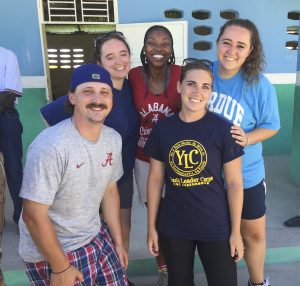Teaching Model Emphasizes Teamwork, Self-Respect, Active Engagement
By David Miller

According to the American Library Association there are more than 100,000 libraries throughout the United States. Every major city and public-school library has books in print and with online services, rare or out-of-stock books are only a click away.
That access isn’t universal, though, and University of Alabama graduate student Sarah Chavada Davis would discover the contrast in resources during a recent trip to Haiti.
Davis, a fourth-year doctoral student in educational psychology, was one of two students from the UA College of Education to help lead teacher professional development in two hillside communities. Davis taught active engagement strategies, while second-year doctoral student Victoria Ivy helped implement “Teaching Personal and Social Responsibility,” an instructional system that focuses on teamwork, leadership and respect, during a one-week visit in the spring.
“I have a 3-year-old son, and his bookshelves at home are full,” Davis said. “So it was surprising that, in Haiti, there were no libraries or books, other than the paper pamphlets the students had that were black and white … kind of bare subject matter. But that didn’t stop the students from wanting to learn.”
The students’ passion for learning and teachers’ enthusiasm for unfamiliar teaching strategies motivated the team of Davis, Ivy, undergraduate accounting major Katherine Scudder, and college faculty Dr. K. Andrew R. Richards and Alicia L. Richards in their goal of implementing the foundations of the TPSR model and active engagement strategies in such a narrow time frame.

Shiver had worked previously with Kevin Richards in a successful after-school program at Holt Elementary to implement some of the pillars of TPSR, a model rooted in physical education and used internationally to teach respect for self and teamwork, with the overarching goal of applying those principles to everyday life.
“When we got to Haiti, we selected throwing and tag activities, and then a combination of both,” said Ivy. “We taught self-control through that, and children learned to not run into each other, boundaries and to tag softly. With throwing and catching, we taught overhand and underhand and then had the children teach each other those techniques.”
The TPSR and active learning components complimented and enhanced the Haitian teachers’ more traditional method of solving problems on a chalkboard. The UA team’s goal was to use more manipulatives and hands-on resources to engage students in the class while individual students worked on solving problems at the board. The students would use blocks and Play-Doh to count and solve math problems, but Haitian teachers don’t typically have access to those materials, so sustaining engagement for future instruction would require creativity, Davis said.
“They didn’t have things like Legos, so we talked about using rocks and/or leaves, or even the barrettes or beads in the girls’ hair to use as manipulatives for practicing math,” Davis said. “With that, one of the things I took away is that ‘less is more.’ When you don’t have enough resources, it forces you to think outside the box. Serving in ministry in Christ Church, now, I’m working on spending fewer on resources and materials and getting children engaged with the outside environment.”
Ivy said the experience validated TPSR as a universal teaching model that could be used across various cultures and incorporated into multiple subjects.
“When we met with the teachers and talked about how the model could be integrated, and when they provided example lessons to fellow teachers, and did so with such passion, that was when I thought ‘they’re not just here because they have to; they’re going to use this,’” Shiver said. “And then seeing them use it enhanced that feeling.”
Davis and Ivy each raised funds privately to fund their trip in the spring and hope to secure funding to return to Haiti in December.
